
Ducati Diavel Service Manual: Reassembly of belly fairing
Position the oil cooler shield (7) inserting the tab (a) into the slit (b) in the electrical components support (s).
Note
On refitting, make sure that the tab (c) remains positioned under the retainers (d) of the shield (7).
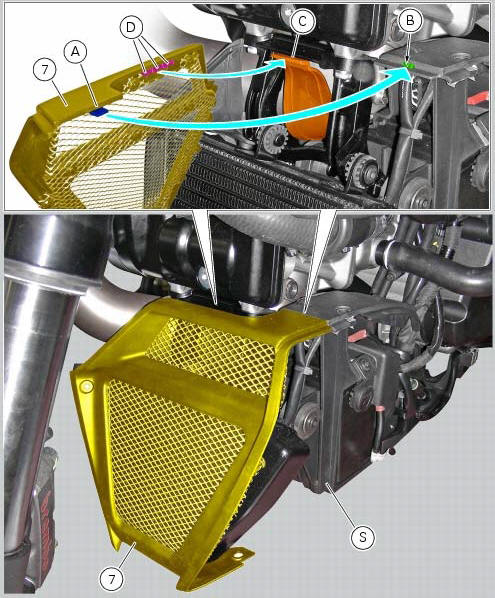
Fit clips (11) on bracket (13) and orient them as shown in the figure.
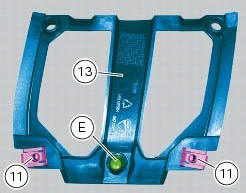
Apply rubber lubricant to the pin (e) of the bracket (13).
Insert pin (e) in the vibration damping pad (f) of the oil cooler.
Fit the bracket (13) on the electrical components support, and tighten the screws (8) to a torque of 4 nm +/- 10 % (sect. 3 - 3, Frame torque settings).
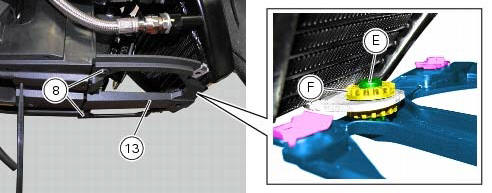
Fit clips (9) on lh belly fairing (2) and orient them as shown in the figure.
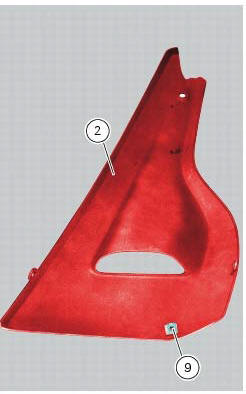
Put the lh belly fairing (2) in position by engaging slot (e) in the electrical components support, as shown in the figure.
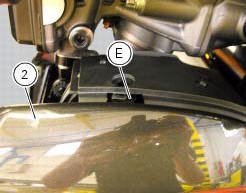
Apply recommended threadlocker on screws (3) and (12).
Fit the nylon washer (4) on the screw (3).
Fix the lh belly fairing (2) to the electrical components support by starting the screws (3) on the rear side, and the screw (12) on the upper side.
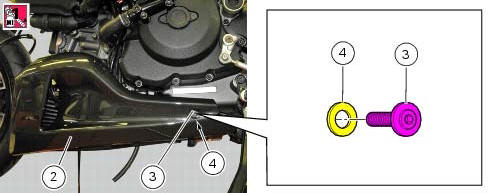
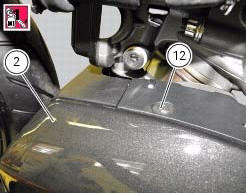
Apply recommended threadlocker to the screws (5) and (8).
Fix the lh belly fairing (2) to the oil cooler shield (7) by starting the screw (8) on the lower side, and the screw (5) on the front side.
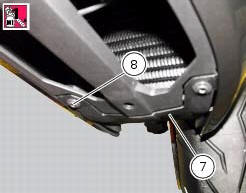
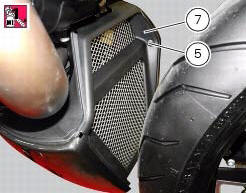
Fit the clips (9) on the rh belly fairing (1) orienting it as shown in the figure; follow the same procedure to refit the lh belly fairing (2).
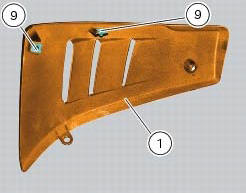
Tighten to a torque of 4 nm +/- 10% (sect. 3 - 3, Frame torque settings) the screws (3), (5), (8) and (12) to fix the belly fairings (1) and (2) and the oil cooler shield (7).
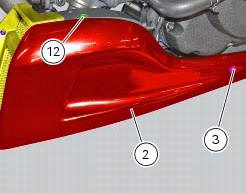
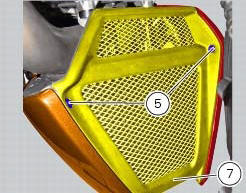
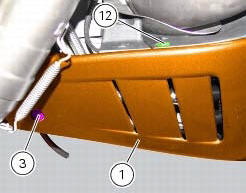
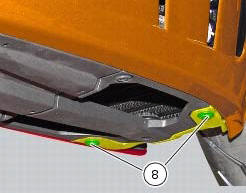
 Removal of belly fairing
Removal of belly fairing
Loosen and remove the screws (5) and (8) that secure the oil cooler (7) to
the rh (1) and lh (2) belly fairings.
Remove the lh belly fairing (2) by loosening the screws (3) with relevan ...
 Electrical components support
Electrical components support
Clip
Screw
Voltage regulator
Battery fixing bracket
Battery support
Vibration damper mount
Hose clip
Vibration damper mount
Clip
Washer
Screw
Cover
Cable grommet
Batte ...
Other materials:
Refitting the air filters
Apply universal sealant in the air duct (2) and (6) groove (d).
Fit seal (7) in the groove (d) having care to place it correctly in the relevant
seat so as to avoid abnormal wrinkles.
Pull out the filter cartridge (1) from the seat in the airbox.
Position the rh air duct (2).
Start ...
Stands
Side stand
Side stand switch
Screw
Plate
Screw
Inner spring
Outer spring
Nut
Rotation pivot
Screw
Screw
Screw
Nut
Clearance adjuster
Spare parts catalogue
Diavel abs stand
Diavel carbon
abs
stand
Important
Bold reference numbers in this section identify part ...
Using a multimeter to check the electrical systems
Introduction
This instrument allows you to measure resistance, voltages, and current
values. Multimeters can be divided into two basic
types: analogue and digital display multimeter. An analogue multimeter has a
pointer display. The dial is marked with the
scales to be used for measurement of ...